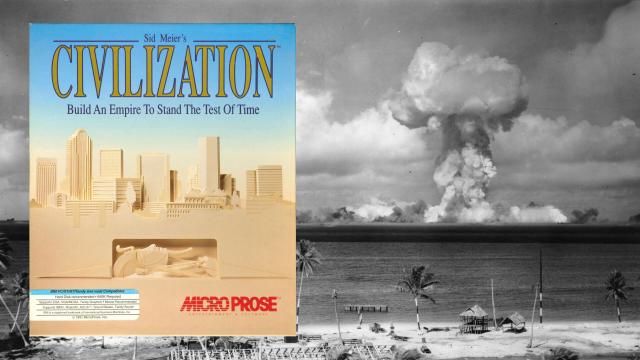It’s common knowledge that you don’t mess with Gandhi in Civilization. Despite the real Indian revolutionary’s dedication to peaceful resistance, his video game counterpart’s proclivity for threatening the player with nuclear weapons is infamous. A popular theory states that this was caused by a bug in the game’s programming, but what if it was all just a shared delusion?
Some quick background. For years, it’s been accepted that Gandhi is so aggressive in the original Civilization due to an overflow error. In short, his aggressiveness stat is low enough that, upon adopting democracy and incurring the government’s inherent drop in militancy, the stat would become a negative value. This would cause it to wrap around to the highest value and subsequently turn Gandhi into a genocidal maniac.
Civilization creator Sid Meier’s memoir — the appropriately titled Sid Meier’s Memoir! — landed at retail yesterday, providing an in-depth look at the life and career of one of gaming’s most prolific developers. The book covers a lot of ground, including the phenomenon of the nuke-happy Gandhi. And while many of us have happily believed the bug theory for years, Meier explains that there is no error in the original Civilization that sends Gandhi off the deep end. It was mostly a matter of perception.
“It is true that Gandhi would — eventually — use nukes when India was at war, just like any civilisation in the game, and at the time this did strike a lot of players as odd,” Meier writes. “The real Abraham Lincoln probably wouldn’t have nuked anyone either, but the idea was that every leader draws a line in the sand somewhere. It’s also true that Gandhi would frequently threaten the player, because one of his primary traits was to avoid war, and deterrence through mutually assured destruction was an effective way to go about that.”
There were other factors that may have contributed to our collective image of Gandhi in Civilization, Meier continues. In those days, all characters used the same script, so the threat of words being “backed by nuclear weapons” was common and not exclusive to any one leader. Furthermore, the Indian civilisation’s dedication to pursuing scientific development meant that it often developed nuclear weapons much sooner than other civilisations, putting them in play as a defensive measure in a way that might have felt super fast to players only coming to grips with, say, gunpowder.
“It’s fair to say that Gandhi could, on occasion, seem a little unnecessarily zealous,” Meier concludes.
The image of Gandhi threatening Civilization players with nuclear weapons is an enduring one, no matter the legitimacy of its origins. It even found its way back into the games themselves as an Easter egg in 2010’s Civilization V, in which the developers gave Gandhi an overwhelming preference for nuclear weaponry in military engagements. This sort of player-driven, emergent storytelling forms the foundation of the world-building games on which Meier has built his career. The promise of meeting our own nuclear Gandhi and tapping into that communal experience is what keeps us coming back for more.
“Gandhi firing nukes is, and always has been, inherently funny, no matter how rarely it actually occurs,” Meier writes.

Leave a Reply